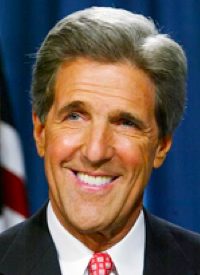
"This is the Tea Party downgrade because a minority of people in the House of Representatives countered even the will of many Republicans in the United States Senate who were prepared to do a bigger deal," Sen. Kerry said Sunday on NBC’s Meet the Press, referencing the Senate’s bipartisan "Gang of Six" plan, which compromised spending cuts for tax increases.
Responding to Kerry’s accusation, John McCain (R-Ariz.) — who recently called House Republicans "hobbits" for their thwarted balanced budget amendment — defended Tea Party Republicans, while congratulating them for keeping their 2008 campaign promises. "For them to then agree to tax increases and spending increases was obviously a repudiation of the mandate they felt they had from last November," asserted the Senator.
Sen. McCain then assailed President Obama’s complacency in debt negotiations. "I agree that there is dysfunction in our system, and a lot of it has to do with the failure of the president of the United States to lead," McCain argued. "The fact is that the president never came forward with a plan. I was gratified to hear that he had plans, but it was never a specific plan, it was always the so-called from behind."
Indeed, in the brief time Congress has had to point fingers, a new round of accusations has commenced. Republicans fault Democrats for modest cuts in spending and Democrats fault Republicans for refusing tax increases. In the wake of S&P’s downgrade, House Speaker John Boehner (R-Ohio) said that "Democrats who run Washington remain unwilling to make the tough choices required to put American on solid ground," while Senate Majority Leader Harry Reid (D-Nev.) charged that "hard-liners" who have ruled out new revenues should be excluded from the approaching fiscal savings discussions.
Martin O’Malley, Governor of Maryland and chairman of the Democratic Governors Association, averred on ABC’s This Week: "We need a balanced approach and the extremism, the Tea Party obstructionism here in Washington, is keeping us from restoring that balanced approach America has always used of investing in the future, investing in job creation, and also being fiscally responsible at the same time."
The Obama administration also joined in the partisan fray. On the CBS program Face the Nation, Obama’s longtime political advisor, David Axelrod, branded S&P’s decision "a Tea Party downgrade." Axelrod claimed that the President has offered compromises on the liberal sacred cow of entitlement reform, but that the deal was dropped because "Republicans are having to respond to this very, very strident group that is pulling them away and believes that compromise is a dirty word. That is a prescription for failure." He then blamed Tea Party Republicans for playing "brinksmanship with the full faith and credit of the United States," and said the U.S. downgrade "clearly is on the backs of those who were willing [the Tea Party] to see the country default."
Former DNC Chairman Howard Dean extended Axelrod’s GOP assault, "I think this is [the] Tea Party’s problem. I think they’re totally unreasonable and doctrinaire and not founded in reality. I think they’ve been smoking some of that tea, not just drinking it." Dean alleged that the S&P downgrade is favorable because it underlines the fact that the U.S. cannot revive its credit rating without tax increases. Apparently a spokesman for the American people, Dean said Americans want the government to raise taxes, "particularly on all [the] gazillionaires the Republican tax cuts mostly benefit."
The civility President Obama pleads for on part of Congress appears to only apply to Republicans. After all, the Democrats in Congress are on the assault, calling Republicans "extremists" and "hostage-takers" and labeling S&P’s decision a "Tea Party downgrade."
Photo: Sen. John Kerry



